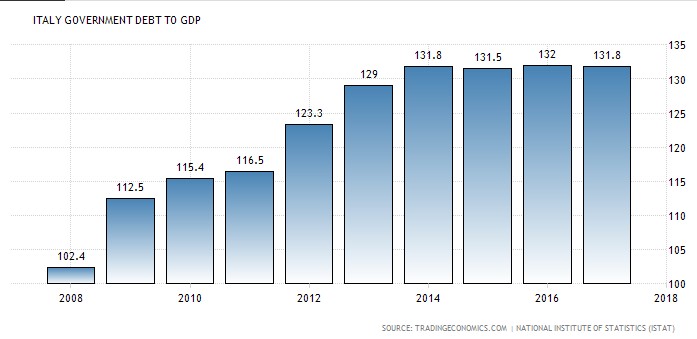- GOLD IRA
- Download Our 2024 Precious Metals IRA Investor’s Guide.
Click Here  Gold IRA
Gold IRA
 Investing
Investing
-
- CRYPTO IRA
- PRICES & STATS
- RETIREMENT PLANS
- BLOG
 Questions? Call (888) 820 1042
Questions? Call (888) 820 1042
Italy Playing Dangerous Game of Chicken With the EU and World Economy
Disclosure: Our content does not constitute financial advice. Speak to your financial advisor. We may earn money from companies reviewed. Learn more

This past week you saw the rapidly deteriorating situation in Italy and by extension the entire European Union grow significantly worse. Italy, one of the G7 nations of the world, a founding member of the EU, a key pillar in the Euro Zone, and an over trillion dollar per year GDP economy, saw its rating outlook drop at the hands of big three global ratings firm Fitch Ratings. The reason given by Fitch was that the new government's fiscal plans create the potential risk for the government to pursue fiscal loosening.
You might say that even the United States has lots its AAA rating. This is a bigger deal then that sovereign rating cut. Italy is in the midst of a still-ongoing banking crisis that started over 10 years ago now. Their banking system is larger than many countries' entire economies.
This is why you need to investigate Gold IRA allocation strategies while you can. Gold makes sense in an IRA and investment portfolio today as it has throughout the last 5,000 years of human history. Today is a good time to review the top five gold coins for investors as well as how and where to buy and store large amounts of gold bullion.
Fitch Explains Its Ratings Outlook Cut On Italy
Fitch hit Italy hard this past week. They lowered the Italian Republic's national credit outlook from stable to negative. They did maintain the long term foreign credit rating at BBB, an abysmal rating for a G7 nation. The Italian government put the best possible spin on it that they could. They applauded Fitch's decision to hold the credit rating steady. Rome turned it around and called it further proof of their economic program's credibility.
Fitch was not so positive in their comments that they issued in their Friday released report:
“The risk of a reversal of structural reforms negatively impacting Italy's credit fundamentals has increased somewhat, in our view. Fiscal and other policy risks are compounded by the relatively high degree of political uncertainty.”
Contrary to what the populist Italian government appears to think (at least publicly), those are fighting words from Fitch. They have thrown down the proverbial gauntlet.
How Did Italy Reach The Point That It Is Constantly Opposing the EU It Helped to Found?
The Italian Finance Minister Giovanni Tria weighed in on the issue, trying to stop the proverbial bleeding. On the trip to China, she referred to a Moody's Investors Service decision to extend the review of Italy's creditworthiness on August 20th with:
“We have European commitments which will be respected. These essentially depend on relations with financial markets.”
Now the Italian government must establish its revolutionary untested economic growth and public finance targets. The deadline for this is September 27th. The European Commission expects the draft Italian budget to be on their desks by the 15th of October.
Yet it is highly unlikely that the government in Rome will still meet the prior fiscal targets of dropping the deficit targets down from the current 1.6 percent of 2018 GDP to only .8 percent of projected 2019 GDP. Their budget was supposed to be completely balanced by 2020. The government has idealistic goals to improve growth and tackle the country's debt situation, but this is seldom practically accomplished in tandem, and rarely if ever in post-Second World War Italy today.
Yet even now the Italian government ministers are making excuses for their anticipated failure to hit these ambitious targets they laid out. The finance ministry spokesman said that thanks to economic growth that is slower than expected, the deficit will actually be around 1.2 percent for 2019.
Meanwhile, the public debt of Italy is a whopping $2.7 trillion (or 2.3 trillion Euros). This makes it the second largest in all of the euro zone area following Greece, according to a representation over Gross Domestic Product. For 2918 it should amount to 130.8 percent of all economic output and narrow slightly to 128 percent for 2019. Finance Minister Tria continues to insist that the national government will keep working out a more gradual debt ratio reduction (despite the declining economic activity as growth proved to be slower than expected for the year.
Gold Is Your Only Sure Line of Defense in Crises Like This One
La Lega Populist Leader and current Deputy Prime Minister/Minister of the Interior Matteo Salvini attacked the EU. Il Giornale reported his angry claims that he is:
opposed to people “who want Italy to be a French or German colony… Europe advises, sometimes threatens, and tells us: you should make a budget of 10 billion euros in taxes. Are they joking? The last thing that Italy needs is taxes. I think you voted for us to do the exact opposite of what Europe has suggested or imposed with their threats.”
When le Maire the French Minister for the Economy issued a warning that Italy's populist government might destabilize the euro zone, Salvini was ready with his usually witty reply:
“Let the French ministers take care of France, we will take care of Italy! And let their souls be at peace; we will do the opposite of what preceding administrations have done.”
If this is not a parting warning shot fired, then nothing is. Italy's destabilization means exactly what le Maire the French economy minister warned: destabilization of the entire euro zone. The EU is the largest economic block in the world and the largest exporting and trading group as well.
Contagion from failing Italian government public finances and banks will quickly reach the shores of America too. This is why you need to start thinking about top offshore storage locations for your Gold IRA now before it gets too late to hedge your investments and retirement accounts.



 Silver
Silver Gold
Gold Platinum
Platinum Palladium
Palladium Bitcoin
Bitcoin Ethereum
Ethereum


 Gold: $2,387.15
Gold: $2,387.15
 Silver: $27.92
Silver: $27.92
 Platinum: $931.02
Platinum: $931.02
 Palladium: $903.43
Palladium: $903.43
 Bitcoin: $67,910.26
Bitcoin: $67,910.26
 Ethereum: $3,278.81
Ethereum: $3,278.81